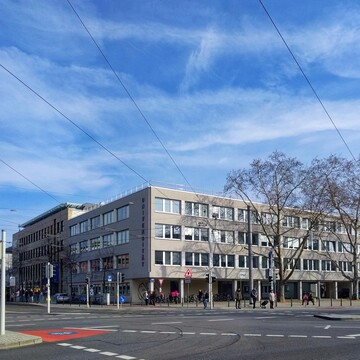Master’s Program in Sociology
Program facts and information
Degree: Master of Arts (M.A.)
Standard period of study: 4 semesters (2 years)
ECTS credits: approx. 120
Language of instruction: English
Language requirements: English; for further information see “Admission requirements and selection"
Program start: Fall semester (September)
Academic calendarSchool: School of Social Sciences
Semester fee: EUR 194 (more information)
Tuition fees for international students from non-EU countries: EUR 1,500
Tuition fees for a second degree: EUR 650Program overview
The master’s program in Sociology is a two-year, research-oriented master's program, which is taught in English in an international academic environment. In line with the school’s research profile, the program focuses on theory-based and methodologically sound empirical-analytical studies.
Students acquire in particular advanced quantitative research methods during the program, which reflects our research focus areas: migration and integration, demographic change, social inequality, comparative welfare state research, empirical educationand labor market research, social network analysis as well as economic and organizational sociology.
In their fourth semester, they will write their master’s thesis, which takes the form of a research paper that is suitable for submission for publication to a social sciences journal. This is meant to prepare our graduates for a career in academia.
Why study Sociology at the University of Mannheim?
The Department of Sociology in Mannheim is one of the leading departments in Europe. It is well known for its empirical-analytical research approach both in Germany and abroad. Many independent national and international rankings have confirmed the outstanding quality of research and teaching at the University of Mannheim on a number of occasions and have praised it as being one of the best university to study Sociology in Germany (take a look at the rankings).
The Department of Sociology cooperates with a variety of research institutions in the field of social sciences, such as the Mannheim Centre for European Social Research (MZES), the newly founded Collaborative Research Center 884, and the GESIS Leibniz Institute for the Social Sciences. This is the perfect environment for you to gain practical experience, for example as a student assistant in leading research teams.
One of the university’s great assets is its international campus. In Mannheim, you will meet students and acclaimed researchers from all over the world, and you can join one of our large international student organizations. You will also benefit from the fact that our academic calendar has been aligned with the international academic year. In addition, we will support you if you want to go abroad. One option is to spend a period of study abroad at one of the school’s prestigious partner universities.
The Career Support at the School of Social Sciences helps students find suitable internships and advises them on their first steps on the job market.
Mannheim is a vibrant city located at the heart of the Rhine-Neckar Metropolitan Region. People with many different nationalities and cultures live here side by side. With more than 8,000 companies headquartered in the region, among them international corporations such as SAP or BASF, it is also a business hub.
Career opportunities
Graduates of our Sociology programs are qualified for many degrees. On the one hand, you can earn a doctoral degree which may lead the way to a career in academia. On the other hand, our graduates are sought-after in expert and leading roles in various departments in companies, associations, international organizations, or the public administration. This includes consulting and strategy development, public relations, organizational development,human resources management and personnel development. Other areas are project and quality management, marketing, and communications.
Required interests and skills
Students of Sociology should
- have a keen interest in and a good grasp of empirical research, particularly quantitative methods,
- enjoy working with complex texts, theories, and methods,
- be capable of analytical and critical thinking,
- have a very good level of English proficiency.
Program structure
Module catalog
The module catalog gives you an overview of the courses and their content.Studying abroad
It is possible but not mandatory to spend a semester or a year abroad during your studies. The School of Social Sciences is part of a global network and maintains partnerships with renowned universities. You can spend a semester abroad on five different continents. Usually, a semester abroad does not extend the duration of your studies, since credits that you obtain abroad are normally recognized by the University of Mannheim. The International Office and the School's exchange coordinators are happy to help you plan a period of study abroad.Internships
The mandatory research internship (6 ECTS credits) is an integral part of the master’s program in Sociology. You can choose between a six-week internship at a research institution for social sciences or a two-week Summer School course with an empirical focus on social sciences. If you work as a student assistant at one of the chairs of the Department of Sociology, your job may, in certain cases, be recognized as equivalent to a research internship.Continuing Education
Certificate programs
Strengthen your potential, deepen your knowledge, find solutions for challenges we will face tomorrow – there are many good reasons to think outside the box, get to know and try out new things even during your studies.At the University of Mannheim, you can do this in the “Studium Oecologicum” which focuses on sustainability. In our certificate program, you will acquire interdisciplinary expert knowledge which can help you to act ethically and to make holistic decisions.
Language courses
Making language learning easier: No matter if you want to learn Japanese, Hebrew, Spanish or Norwegian, take the Graduate Record Examination Test (GRE), The European Language Certificates (telc) or the TOEFL test – each semester, the University of Mannheim offers language courses and language certificates in more than 16 languages for students and non-university members, online and on campus!Studium Generale
Are you interested in IT or communication trainings or theater, music, or drawing courses? Studium Generale has a vast range of courses available to all.Doctorates
Successful graduates are encouraged to apply for the doctoral program at the Center for Doctoral Studies in Social and Behavioral Sciences (CDSS) of the Graduate School of Economic and Social Sciences (GESS). This not only prepares them for an academic career, but also allows them to specialize in different fields of study. Usually, doctoral candidates will also join the team of academic staff members or teach from their second year onwards, which is a unique opportunity for them to gain valuable practical experience. In some cases, credits obtained during the master's program can be counted towards the doctorate requirements, thus reducing the time needed to complete the doctoral program.
It is also possible to pursue a doctorate at a chair of the School of Social Sciences.
Admission requirements
In our selection process, we take numerous criteria into account. For more details, please check the selection statutes (see below). Be bold! Please do not hesitate to contact us if you need advice. We are looking forward to receiving your application!
Admission requirements (subject to approval by the university committees and the German Ministry of Science, Research and Arts)
If you have not yet completed your bachelor’s degree, you may still apply for a master’s program as long as will provide a proof that you have obtained at least 130 ECTS credits.
- Completion of a bachelor in Social Sciences (in particular sociology, political science, psychology or media and communication studies) or business administration or economics, or a degree recognized as equivalent by the selection committee, completed with a grade of “good” or better (equivalent to the German grade of 2.5) at a German higher education institution or abroad (also Berufsakademie) and corresponding to at least 180 ECTS credits or a standard period of study of at least three years
- Good grades (or better) from the first degree (at least average grade 2.5) in the areas of quantitative methods, empirical social research, statistics or mathematics (at least 24 ECTS).
- Quantitative thesis are counted with a maximum of 6 ECTS credits towards the required 24 ECTS credits; crediting also requires a certificate from the thesis supervisor confirming the empirical-quantitative nature of the thesis.
- Proof of proficiency in English (may be submitted by 15 August)
Selection criteria
The selection criteria are irrelevant since this program of study is currently not selective.Selection statutes
Under “Admission requirements and selection” we have compiled the most important selection criteria of the program for you. For more detailed explanations of the selection process and the legally binding requirements of the degree program, please refer to the selection statutes.Application
Scholarships and funding
The university offers various funding opportunities. Around 200 Mannheim students receive scholarships every year, which are intended to give them the freedom to focus on their academic achievements or to continue their voluntary work alongside their studies. Find out more about the funding opportunities and feel free to apply, for example, for the Deutschland Scholarship, the Opportunity Mannheim Scholarship or the Elite Sports Scholarship Rhine-Neckar Metropolitan Region.Funding opportunities for international degree-seeking students
Application deadline
The application deadline for fall semesters starts on 1 April and ends on 15 May.It is not possible to apply for the spring semester.
Contact

Dr. Claudia Eckhardt-Kamps (she/her)
School of Social Sciences
A 5, 6
Building A – Room A 417
68159 Mannheim
Please note: Only online consultations are offered currently. Please make an appointment at https://www.sowi.uni-mannheim.de/online-beratung/claudia-eckhardt-kamps/

Admissions Office
L 1, 1 – Room 157, 158
68161 Mannheim




